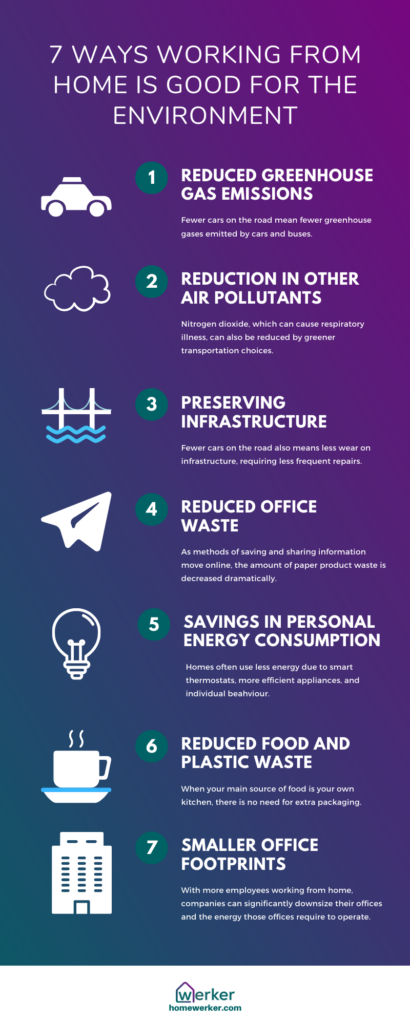We know that working from home can help with efficiency and productivity, We also know that many workers associate working from home with increased happiness and often better work-life balance. However, working from home can also be a very effective tool in improving the environmental impact of businesses. And we’re going to get into the latest science behind it all!
Is working from home good for the environment?
Working from home can have the following positive environmental impacts: (1) reduced greenhouse gas emissions, (2) reduction in other air pollutants, (3) a decreased impact of infrastructure, (4) reduced office waste, (5) reduced overall energy usage, (6) reduced food and plastic waste, and (7) reduced office sizes themselves. When considering these seven factors, indeed working from home is good for the environment.
1. Reduced greenhouse gas emissions
The most immediately obvious environmental impact of working from home is the reduction in greenhouse gas emissions from removing the everyday commute for thousands and thousands of workers. Fewer cars on the road mean fewer greenhouse gases emitted by cars and buses. It is estimated if most workers switch to working from home 50% of the time that there would be a massive decrease in greenhouse gases by 51 million metric tons per year.
The EPA ranks transportation as the single largest contributor to greenhouse gas emissions. A large bulk of this amount comes from the daily commute. This is because around 90% of existing transportation methods use petroleum products like gasoline. When people remove their daily commute en masse there is a measurable reduction in carbon emissions. Preliminary studies have already started to show major reductions in cities after the COVID-19 lockdown was put in place globally.
It is estimated that the use of 3 billion gallons of gas and the emission of 26 million tons of greenhouse gases can be removed from our transportation system per year from idling vehicles alone if remote work is embraced in a serious way.
Measurable reductions in greenhouse gases that contribute to global warming are probably the single greatest environmental benefit from remote work.
2. Reduction in other air pollutants
Greenhouse gases are not the only negative pollutants that can be substantially reduced from large populations working from home. A study in Nature has shown clear effects of this. The study examined known air pollutants before and after the COVID-19 pandemic by looking at satellite imagery. In China and Italy (countries that were quick to institute lockdowns and mandatory working from home policies) showed massive reductions in nitrogen dioxide concentrations in major urban centers. Nitrogen dioxide (NO2) is an airborne pollutant that can cause respiratory illness and is generally a result of petroleum-burning vehicles and coal power plants.
So not only are greenhouse gases reduced by cutting out the commute, other dangerous air pollutants are as well. As society moves to a post-oil economy with greener transportation, it may be very beneficial to move many jobs to a remote model.
3. Less cars on the road and smaller impact on infrastructure
As cars are removed from the road, less wear and tear can be expected. A major source of greenhouse gases is also industries that are set up to maintain roads and other mass infrastructure. The sometimes crumbling infrastructure of the US could benefit greatly by having fewer traffic jams and usage in general, resulting in repairs less often.

4. Reduction in office waste
Office waste is a major impact of having large workforces that work out of centralized locations. The EPA estimates that the average office worker produced around 2 pounds of paper every workday. When employees work from home, the amount of paper product waste is decreased dramatically, as dominant modes of saving and transferring information move online. It is also clear that those working from home are less likely to choose to use paper as recklessly as in the office environment where it is harder to perceive individual use of these products. When you note that you ran through a full ream of paper in a week, you’ll notice since you are the only one contributing to this.
Since the average office worker consumes about 10,000 sheets of paper each year, digitally-based jobs eliminate the need to dispose of or recycle 247 trillion sheets or 2.47 trillion pounds of paper annually.
Virtual Vocations
The move to digital collaboration tools like Zoom, Microsoft Teams, GSuite, and others is accelerated as more and more workers move to work remotely. As the use of these tools becomes more and more part of corporate culture, less paper usage will result, a huge win for the environment,
5. Reduced energy usage at home VS the office
Research has shown that individuals can save 9.33 kW h per day if they switch to working from home. Heating and cooling large offices can get very expensive, resulting in huge energy costs. Homes, on the other hand, can be tuned specifically to an individual, often using less energy due to smart thermostats and other more efficient appliances. Offices have many power-hungry devices aside from heating and cooling systems like server rooms, industrial-grade printers, and lighting systems.
Office equipment energy consumption rate is twice that of home office equipment energy consumption.
Global Workplace Analytics Report
As long as you are reasonable about how you heat and cool your home, and you keep an eye on unnecessary lights being on, you can substantially reduce the overall energy use of your job if you work from home.
6. Reduced food and plastic waste
Food waste has become a scourge for modern urban living. Since office workers need to either bring food with them to work every day or buy it once there, plastic and other waste can be substantial. When your main source of food is your own kitchen there is no need for extra packaging, disposable single-use plastic cutlery, and other wasteful plastics for your meals. Just don’t eat during a video call…
Those working from home are also more likely to efficiently use the food on hand as opposed to eat out regularly and let groceries go to waste. Not only can this be much more healthy for the WFH individual, but it can also have a major impact on the environment if it is done en masse.
7. Smaller offices use less energy
As more and more workers opt to work from home, the necessity for large offices with the associated appliances, workspaces, server rooms, lighting, and heating will diminish. We are already seeing thousands of companies opt to downsize their physical office operations in favor of a smaller office with shared workspaces. Companies can now get away with fewer and fewer permanent office spaces and duplicate meeting rooms. This reduction in energy can also be a significant contributor to lessening the carbon footprint of many businesses, primarily due to more remote workers.
Conclusion
Scientific evidence is mounting about the very positive role working from home can play on the environment if it is adopted widely. Not only can remote work lead to productive and happy employees, but businesses can enjoy huge efficiency gains that result in major reductions in carbon footprints and reduced overall pollution. Decreased air pollution and better use of energy are a worthwhile investment. One that can be led by those opting to work from home.






2 Comments